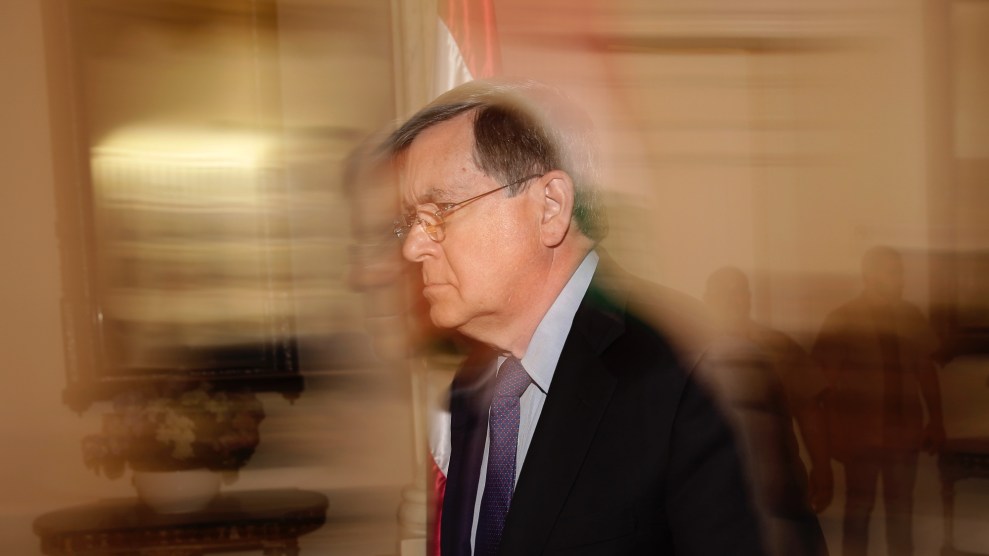
Satterfield in Lebanon while mediating a 2019 border dispute with Israel.Hassan Ammar/AP
On Sunday, amid worsening conditions in Gaza, the US State Department named former Ambassador David Satterfield as a special envoy for Middle East humanitarian issues. Satterfield, an Arabic-speaking veteran diplomat who previously served as ambassador to Lebanon and Turkey, will, the department said, “lead US diplomacy to urgently address the humanitarian crisis in Gaza, including work to facilitate the provision of life-saving assistance to the most vulnerable people and promote the safety of civilians.” The appointment is an indication that, despite the Biden’s administration’s general embrace of Israeli tactics since Hamas’ deadly surprise attack, the US may be willing to apply some pressure to mitigate the suffering its military action has brought and will bring.
Israel has suggested it is preparing to imminently launch ground operations in Gaza. Its airstrikes and the evacuation it ordered of more than 1.1 million people living in northern Gaza have already resulted in widespread displacement inside the Palestinian territory, with the United Nations warning that it is “impossible for such a movement to take place without devastating humanitarian consequences.” After a week of heavy bombardment, doctors in the besieged area have warned of a “catastrophe,” and human rights observers have highlighted shortages of water and basic supplies.
“If there is massive Israeli ground incursion,” Satterfield told BBC News on Tuesday, “the more Palestinian innocents are killed, the better Hamas’ interests and Irans’ are served.”
Today I announced the @POTUS appointment of David Satterfield as U.S. Special Envoy for Middle East Humanitarian Issues. He will lead efforts to address the humanitarian crisis in Gaza and coordinate with our partners to provide life-saving assistance to the most vulnerable.
— Secretary Antony Blinken (@SecBlinken) October 15, 2023
Satterfield has previously acted an assistant secretary of state and a National Security Council staff director, and led the multinational force overseeing Israel and Egypt’s peace agreement. In April 2022, Satterfield stepped down as as a special envoy for the Horn of Africa after only a few months on the job, and soon assumed a position leading Rice University’s Baker Institute for Public Policy.
At Rice, Satterfield helped convene an event this April marking the 75th anniversary of the state of Israel. In an open letter to Satterfield published at the time in Jewish Currents, Tareq Baconi, president of the board of Al-Shabaka, the Palestinian Policy Network, explained his decision to decline an invitation to participate, criticizing the conference agenda and a “celebratory dinner” planned to conclude the event.
The “conference is set up to create an echo chamber of the worst kind, one that is sure to perpetuate a strictly Zionist ideology,” Baconi wrote, citing a panel whose only members would be five current or previous American ambassadors to Israel. As the solitary guest included on the draft agenda who could be expected to offer a Palestinian perspective, Baconi explained that he felt he was placed in an impossible position: “either participate as a token even though the odds are stacked entirely against us, or refuse to play the game—and have our refusal used to justify our continued subjugation.”
Speaking to the press from Egypt on Sunday, US Secretary of State Antony Blinken reinforced US support of Israel and talked about preventing the conflict from spreading throughout the region and securing the release of hostages taken by Hamas, including American citizens.
“Israel has the right, indeed it has the obligation, to defend itself against these attacks from Hamas and to try to do what it can to make sure that this never happens again,” Blinken said. “As I said in Tel Aviv, as President Biden has said, the way that Israel does this matters. [Israel] needs to do it in a way that affirms the shared values that we have for human life and human dignity, taking every possible precaution to avoid harming civilians.”

















